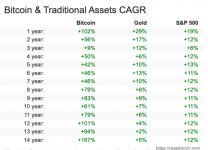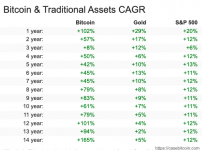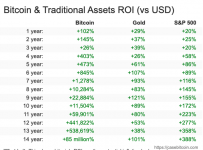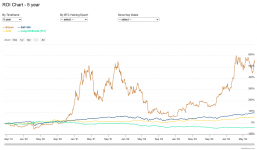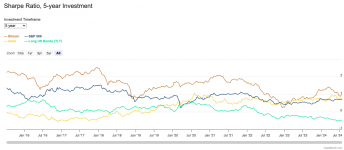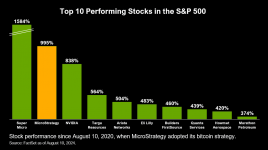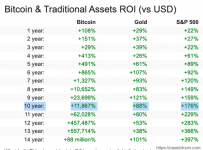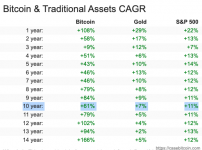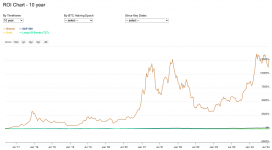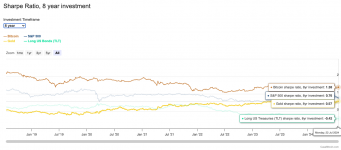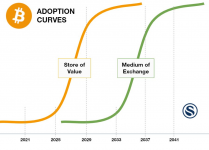You're cherry-picking to find a period of time when, if someone bought bitcoin once, they are only up x% or slightly down. Those aren't real examples.
I’m actually not cherry picking at all. It was intended as a nominal case example (buying exactly between the bottom and the top). That was chosen as a simplified result of what the average outcome would have been (not the best case, or worst case). Pretty much the exact opposite of cherry picking.
Also, go to your example in the OP:
226,500 BTC at $8.3 billion is an average price of $36,144 per BTC….which falls almost exactly between the bottom and the top. So this return mentioned in my post was about the same as Microstrategy got.
Do you know anyone who bought bitcoin once?
I don’t track such things, but when someone makes a very large bet at a specific point in time on an asset, the timing of that is very important, and carries a lot more weight than if they just DCA’d their way into an asset. An example of this was a CEO of a company called MicroStrategy deciding to convert his company’s entire cash reserves into BTC in 2020 (the bottom). Had he made the same decision in 2021 or 2022, he’d have been endlessly ridiculed
As it were, he converted the largest percentage of his position in 2020 (which was the recent price floor), and DCA’d the cash flows from there.
If you were to compute the CAGR on converting $8.3 billion into $13.5 billion over 4 years, the result is 12.93% annual return on average, which is almost exclusively influenced by the huge position he took out in 2020, and was gradually made worse from there with the cash flow conversions.
So, I’d argue its actually you that might be cherry picking. This entire example is a guy that essentially called the bottom correctly on a big bet, and 13% per year over 4 years is all he had to show for it. He could have done infinitely better in real estate or any number of other non-contrarian positions.
ETA: Had Saylor dumped that same $8.3 billion cash reserve into the S&P 500 index at the same time in 2020 (instead of BTC), the CAGR would have been 12.4%. 0.5% less return than an investment with substantially less risk, and a much longer proven track record. So what are we even talking about here?
The S&P 500 once? If they did, did they buy the exact top? Do you apply that same rubric to every asset? What asset passes that rubric?
This is a faulty comparison, and a red herring argument, for the reasons already noted.
I'm consistent. I always use a 5+ year CAGR to compare bitcoin to other assets:
View attachment 626079
If you posted this chart every day for the past 5 years, how many days would the 1 year and 3 year CAGR be negative? Saying you only look at a 5+ year horizon on an asset that’s only 10-12 years old is pretty silly. It’s been range bound between about $15,000 and $65,000 for the better part of a decade now….having hit both extremes multiple times. The 5-year CAGR will continue to look good….until it doesn’t. Same situation as any other infant asset class.
When bitcoin is being outperformed, I can admit it. I don't cherry-pick to suit my portfolio.
As far as all the gains have already been made, you are not the first person to think that:
View attachment 626077
Neat. Hold my beer while I jump into the time machine and go to the original GenesPage, and find some guy who bought Amazon back in 1998
Comparing bitcoin gains today to bitcoin gains 10 years ago isn't useful. You should only compare bitcoin gains today to other assets today. Bitcoin doesn't have to outperform bitcoin in 2014 to outperform the S&P 500 in 2024.
False. You should only compare Bitcoin gains to those in the same risk segment. The S&P 500 has a 90 something year track record that shows far less long term risk than any crypto. There are also individual stocks that inherently carry higher risk, but have outperformed BTC over the same horizons.

